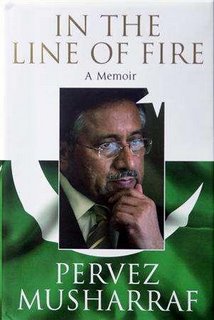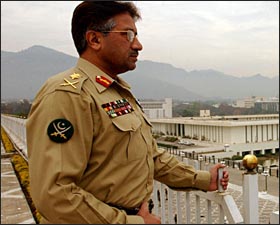 Mush...Musharraf
Mush...MusharrafSoon after General Musharraf had taken over as the head of Pakistan, the Dawn columnist Ardeshir Cowasjee was talking to a women's delegation. Telling them that this was perhaps the best time in recent years to get some outdated misogynist laws repealed, Cowasjee had said, "Ladies, while the General is batting, ask away."
This, more than anything else, succinctly summed up the initial euphoria that Pakistan's intelligentsia felt with General Pervez Musharraf's rule. To many Pakistanis it seemed that this gallant and decorated army general, hailing from a modern and secular middle class background could deliver. The two earlier democratic goverments of Benazir Bhutto and Nawaz Sharif, with their corruption and nepotism not to mention the constant pandering to right wing sentiments for votes, had left many people disillusioned. Musharraf, however, could't deliver all that he had promised but as a start he did take some baby steps toward modernity and has tried to keep extremely retrograde Islamic laws at bay.
In the meantime 9/11 happened and Musharraf was under extreme pressure to cooperate with the US and bring scores of Taliban and other terror outfits, operating both out of Afghanistan and Pakistan, to book. The armed incursions that the Pakistani army had to make into the border territory with Afghanistan made Musharraf extremely unpopular both within the army and among his own people. Twice in the last few years he came close to being assassinated. So fraught with dangers is his job that in the words of the TIME magazine he holds the "world's most dangerous job". There are also rumors that he owes his position, indeed his very life, to the help and support of the US Intelligence.
 In his autobiography In the line of Fire , that was released in September this year, Musharraf talks about Pakistan, Islam,
In his autobiography In the line of Fire , that was released in September this year, Musharraf talks about Pakistan, Islam, Al-Qaeda and the terrorism that is threatening peace today. He also shows us glimpses from his childhood, the years spent in Turkey (where his father served in the Embassy) and his youth in the Pakistan Military Academy. From the Academy to the Army House (the home of Pakistan's Army Chief) to the Head of State, the journey was fraught with dangers. Obviously he takes immense liberty with facts. And nowhere is this more evident than his recounting of the hijacking drama of 1999, when following his dismissal by Nawaz Sharif's govt. as the Army Chief, he was denied the right to land in his own country. He then goes on to call his dismissal as Sharif's coup; his own coup d'etat where he deposes a democratically elected govt then conveniently becomes a "countercoup".
The next few chapters deal with rebuilding the economy. Although it is well known that Musharraf did initiate an economic liberalization program spearheaded by his Finance Minister, New York banker Shaukat Aziz, this section is mainly a self applaudatory exercise. As his the following section where is talks of his "achievements" in the war on terror.
However, to his credit he is extremely critical of the appeasement of the religious right in Pakistan. And of two of Pakistan erstwhile leaders, Zulfikar Ali Bhutto and Gen. Zia-ul-Haq, for their kowtowing to the religious fundamentalists. In his own words
By the time his regime ended, I had come to the conclusion that Bhutto was the worst thing that had ever happened to Pakistan. I still maintain that he did more damage to the country than anyone else, damage from which we have still not fully recovered. Among other things he was the first to try to appease the religious right. He banned liquor and gambling and declared Friday a holiday instead of Sunday. This was hypocrisy at its peak, because everyone knew that he did not believe in any one of these actions
And this later about Zia
President Zia, in the 1980s, completed what Bhutto had started in the dying phase of his regime- the total appeasement of the religious lobby. By hanging Bhutto, he turned Bhutto into a martyr and his political party-the PPP-into a great force. Zia found it convenient to align himself with the religious right and create a supportive constituency for himself. He started overemphasizing and overparticipating in religious rituals to show his alignment with the religious lobby. Even music and entertainment became officially taboo, whereas I am told that in private he personally enjoyed good semiclassical music.
 pictures scanned in from the book (without permission)
pictures scanned in from the book (without permission)Interspersed are stories of his love for a East Pakistani Bengali girl, his arranged marriage to his wife Sehba after their long courtship and the birth of his children. He also tells us his distaste of Islamic laws. About a lashing he says,
It was an ordeal just to be present at such a distasteful event, the most inhuman and humiliating that I have ever witnessed. The jailer set out a sofa for me, and a table laden with cakes and pastries for my pleasure. The image of a Roman Colosseum sprang to my mind. The least I could do was order him to remove the cakes and pastries immediately.
.....................................................................................
The lasher began by drawing a line with a marker across the buttocks of the criminal, indicating the exact spot where the lashes were to be delivered. He came running and gave the first lash as hard as he could. The man tightened his muscles on the first lash, squirmed on the second, and screamed on the third. I could barely look at the fourth and the fifth. I could see red fleshy pulp on his bottom. A crude doctor appeared, checked the miserable man, and then did the stupidest thing. He started pressing the man's bottom with his feet with all his weight on it.
I have never been more disgusted, not just at the inhuman treatment but also at the unfairness of it all.
However, Gen. Mush does not tell us all. He keeps some of his nation's secrets, just that way. While he mentions the secession of Pakistan's East wing, thanks to India's military aid, he conveniently forgets the horrific violence that the Pakistani Army had unleashed on the people of the erstwhile East Pakistan in 1970-71. This terror that continued for months and left millions dead and homeless, eventually led to the secession of the Eastern part to form a new nation, Bangladesh, in 1972.
He also does not tell us about the proxy war being carried out in Kashmir by terrorists trained in Pakistan or about the Agra summit that by virtue of being held pre 2001, had him singing a different tune. Mum is the word on how Pakistan's Intelligence Agency, the notorious Inter Services Intelligence or ISI that literally cut its teeth on training terrorists from the Soviet-US days in Afghanistan, became a mischief monger aiding and abetting terror outfits from Kashmir to Chenchnya. No Pervez Musharraf keeps the bad news under wraps. And sings paens to himself and his attempt to transform Pakistan into a modern state.

0 Comments:
Post a Comment
<< Home